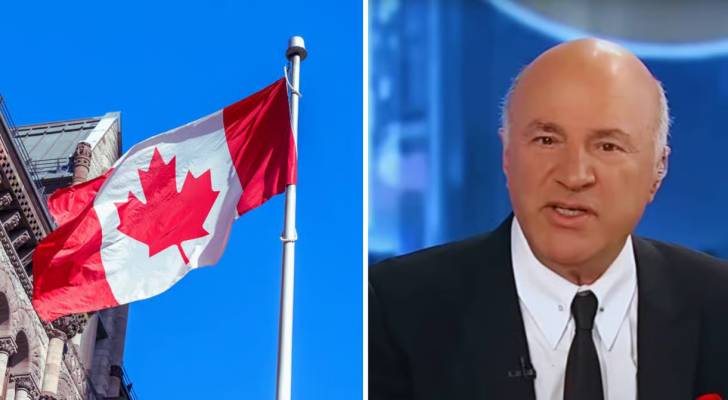
Shark Tank host Kevin O’Leary has a broad portfolio of strong opinions and is rarely shy about sharing them. In a recent Fox Business interview, the Montreal-born entrepreneur confidently asserted that a growing number of Americans have been fleeing to Canada in recent months because of our nation’s relatively open immigration policies.
“The immigration policy there is currently more liberal than it is in the U.S.,” he told host Stuart Varney. “In the U.S., immigration has fallen to zero, and many people would like to see it addressed in a more organized and legal way. But while it remains so tight, many people are taking advantage of policies that were implemented during the Trudeau era that have not yet been modified.”
“So, they’re not leaving because they don’t like the U.S.” Varney responds.
O’Leary seems to have misunderstood the question — here’s the catch: U.S. citizens don’t need immigration leniency to move abroad. And the data shows Americans are leaving the country for very different reasons. Here’s a closer look at recent statistics and what they actually mean.
U.S. Citizens moving abroad
More Americans sought refugee status in Canada in the first half of 2025 than during all of 2024, according to the Immigration and Refugee Board (1). The agency doesn’t reveal the reasons specified by applicants, but there are concerns of the Trump administration’s crackdown on LGBTQ rights and general political unrest.
Transgender Americans, in particular, are increasingly seeking asylum in Canada, lawyers told Reuters (2). Gay couples who spoke to CTV News in April (3) pointed to growing threats to marriage equality and gun safety concerns as reasons for moving north.
Even academics are making the move. In an opinion video for The New York Times (4), three Yale professors said they were relocating to the University of Toronto because of rising concerns pertaining to the emergence of authoritarianism in the U.S.
A global trend: Not just Canada
Many Americans are also moving, not just to Canada but other parts of the world, due to economic concerns. Roughly 1,285 U.S. citizens expatriated in the first quarter of 2025, up 102% from the last quarter of 2024, according to U.S. government data analyzed by CS Global Partners (5). The report suggests the rate of expatriation could break a previous record set in 2020.
Some Americans are even shopping for so-called “golden passports” — citizenship-by-investment programs that allow people to essentially buy a second nationality. Caribbean nations such as St. Kitts and Nevis or Dominica offer dual citizenship starting at around US$130,000. For wealthy expats, these passports can provide visa-free travel, tax advantages and a hedge against political uncertainty at home.
Why go to such lengths? A Fast Company-Harris poll found that nearly half of Americans who’ve considered moving abroad cite the cost of living (49%) and dissatisfaction with politics (48%) as top drivers (6). For some, buying a golden passport is simply the most efficient way to lock in a Plan B.
Moving abroad to improve finances
Although it’s relatively easy to find a country with a lower cost of living than the United States, that’s only one of the many financial factors that could impact these Americans looking for more stable shores.
For instance, U.S. citizens are obligated to pay taxes to the Internal Revenue Agency (IRA) regardless of where they live. Depending on where they move, they could be subject to double taxation or withholding taxes on their income. The same is equally true of Canadians living abroad (7), who may still have to pay federal and provincial/territorial taxes after they relocate.
Finally, options for income and employment can change depending on where you live. Americans may be able to work remotely for a U.S.-based company, but international job markets may have a tough time absorbing a flood of U.S. immigrants, as record-low unemployment rates make for a competitive labour market.
While it remains to be seen how many Americans begin packing their bags for Canada or the EU during a period of political unrest, rising prices and competitive jobs markets across the west will make it difficult for American immigrants to find solid financial footing in their new homes.
Article sources
We rely only on vetted sources and credible third-party reporting. For details, see our editorial ethics and guidelines.
Immigration and Refugee Board of Canada: Claims by Country of Alleged Persecution – 2025 (1); Reuters: More Americans applying for refugee status in Canada, data shows (2); CTV News: Gay couples moving to Canada as fear over Trump policies climbs (3); YouTube: NYT Opinion – We’re Experts in Fascism. We’re Leaving the U.S.(4); CS Global: US Expat Numbers Double in 2025 as Americans Seek New Lives Abroad (5); The Harris Poll: Bracing For Tariffs, How Politics Shapes Your Economic Mood, The Battle Over Communication Inflation, and More of Us Are Expat-Curious (6); Government of Canada: Travelling and money (7)
This article provides information only and should not be construed as advice. It is provided without warranty of any kind.